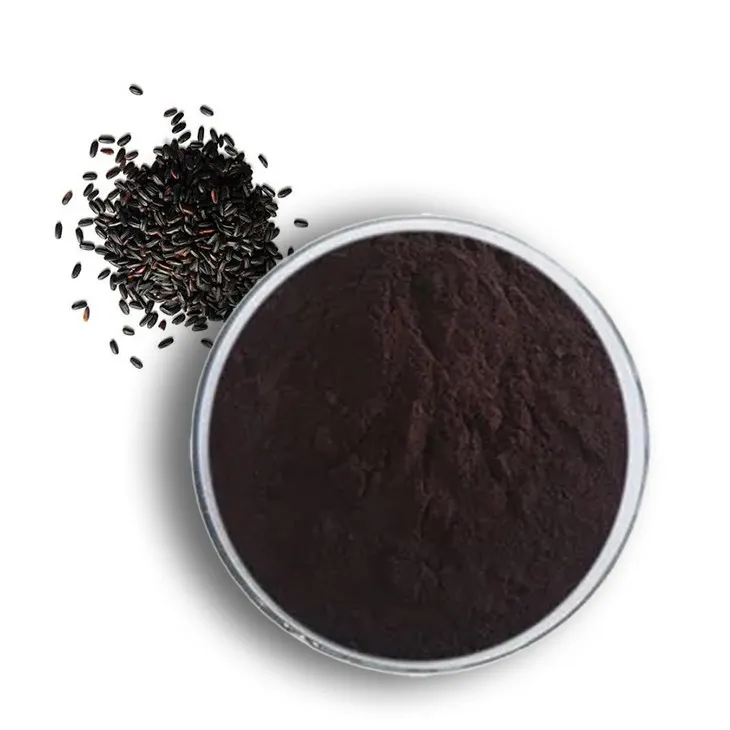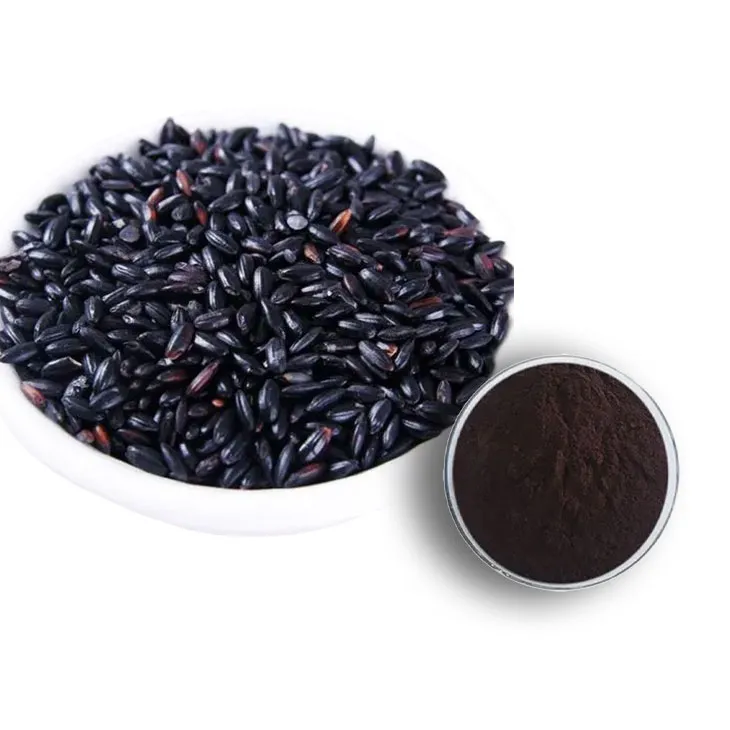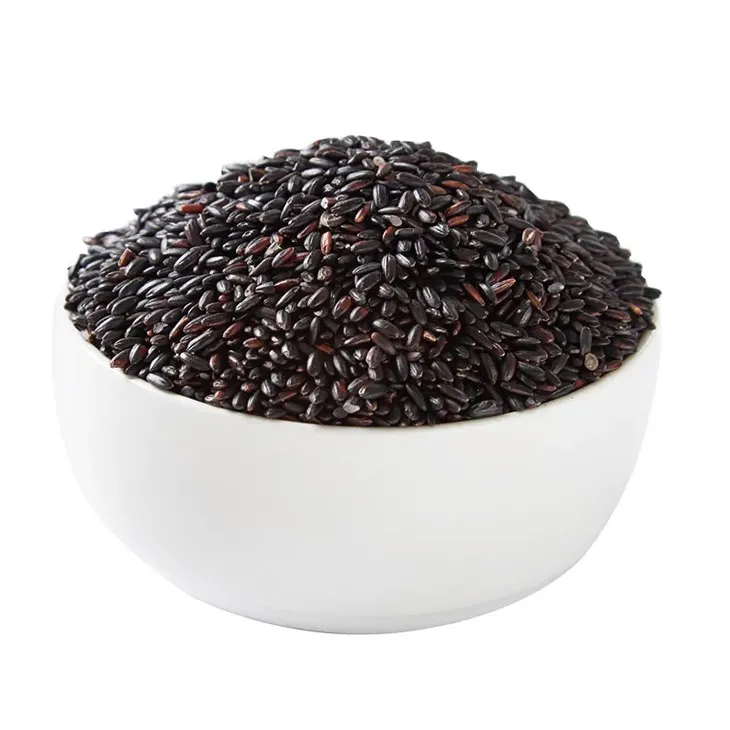- 0086-571-85302990
- sales@greenskybio.com
Does black rice extract have benefits for diabetes? Are these all safe and applicable for diabetic patients?
2024-11-12

1. Introduction
Diabetes has become a global health concern, affecting millions of people worldwide. Management of diabetes involves various aspects, including diet, exercise, and medication. In recent years, there has been growing interest in natural products and their potential benefits for diabetic patients. Black rice, a type of pigmented rice, has been studied for its possible health - promoting properties. Black Rice Extract, in particular, has attracted attention for its potential role in diabetes management. This article aims to explore whether Black Rice Extract is advantageous for diabetes, looking at its effects on blood sugar regulation, insulin sensitivity, and overall diabetic health. Additionally, it will examine the safety aspects for diabetic patients, considering factors such as possible interactions with medications and individual health variations.

2. Composition of Black Rice Extract
Black rice extract contains a variety of bioactive compounds that may contribute to its potential health benefits. Anthocyanins are one of the main components, which are responsible for the black color of the rice. These are powerful antioxidants that can scavenge free radicals in the body. Other components include phenolic acids, flavonoids, and dietary fiber.
The phenolic acids in black rice extract, such as ferulic acid, have been shown to have anti - inflammatory properties. Flavonoids, on the other hand, can also act as antioxidants and may play a role in modulating cellular signaling pathways. Dietary fiber in black rice extract can help with digestion and may have an impact on blood sugar levels by slowing down the absorption of carbohydrates.

3. Potential Benefits for Diabetes
3.1 Blood Sugar Regulation
One of the key aspects in diabetes management is the regulation of blood sugar levels. Black rice extract may play a role in this through several mechanisms. The dietary fiber present in the extract can slow down the digestion and absorption of carbohydrates. This means that glucose is released into the bloodstream more slowly, preventing sudden spikes in blood sugar levels.
Moreover, some studies suggest that the bioactive compounds in black rice extract, such as anthocyanins, may directly affect the cells involved in glucose metabolism. They could enhance the uptake of glucose by cells, thus reducing the amount of glucose in the bloodstream. For example, in vitro studies have shown that anthocyanins can stimulate glucose transporter proteins in cells, which are responsible for transporting glucose from the bloodstream into the cells.
3.2 Insulin Sensitivity
Improving insulin sensitivity is crucial for diabetic patients. Insulin is the hormone that helps cells take up glucose from the bloodstream. In some cases of diabetes, cells become resistant to insulin, leading to elevated blood sugar levels.
Black rice extract may have the potential to improve insulin sensitivity. The phenolic acids and flavonoids in the extract could modulate the signaling pathways involved in insulin action. By doing so, they may help cells respond better to insulin. Some animal studies have indicated that black rice extract supplementation can improve insulin sensitivity in diabetic animals, although more research is needed to confirm these findings in humans.
3.3 Overall Diabetic Health
Diabetes is associated with various complications, including cardiovascular diseases, kidney problems, and nerve damage. Black rice extract, with its antioxidant and anti - inflammatory properties, may have a positive impact on overall diabetic health.
The antioxidants in the extract, such as anthocyanins, can help reduce oxidative stress in the body. High levels of oxidative stress are often observed in diabetic patients and are associated with the development of complications. By reducing oxidative stress, black rice extract may help prevent or delay the onset of these complications.
The anti - inflammatory properties of black rice extract can also be beneficial. Chronic inflammation is another factor contributing to the development of diabetic complications. By reducing inflammation, the extract may contribute to better overall health in diabetic patients.

4. Safety Aspects for Diabetic Patients
4.1 Interaction with Medications
Diabetic patients often take medications to control their blood sugar levels. It is important to consider whether black rice extract may interact with these medications. Some medications for diabetes work by increasing insulin secretion or improving insulin sensitivity. If black rice extract also has similar effects, there could be a potential for over - treatment, which may lead to hypoglycemia (low blood sugar).
For example, if a patient is taking sulfonylureas, a class of drugs that stimulate insulin secretion, and simultaneously consuming black rice extract that also enhances insulin secretion, the combined effect could cause blood sugar levels to drop too low. Therefore, it is crucial for diabetic patients to consult their healthcare providers before starting to take black rice extract supplements if they are on diabetes medications.
4.2 Individual Health Variations
Each diabetic patient is unique, and individual health variations can affect the safety and efficacy of black rice extract. Some patients may have underlying health conditions such as kidney or liver problems. The metabolism and clearance of black rice extract may be affected in these patients.
For example, patients with kidney problems may have difficulty excreting the metabolites of black rice extract. This could potentially lead to the accumulation of certain compounds in the body, which may cause adverse effects. Similarly, patients with liver diseases may have altered metabolism of the bioactive compounds in the extract, affecting its safety and effectiveness.
5. Current Research and Evidence
While there is some promising evidence regarding the potential benefits of black rice extract for diabetes, more research is still needed. Most of the current studies are in vitro or animal - based, and human trials are relatively limited.
In vitro studies have provided valuable insights into the mechanisms by which black rice extract may affect glucose metabolism and insulin sensitivity. However, the results from these studies cannot be directly extrapolated to humans. Animal studies have also shown some positive effects of black rice extract on blood sugar regulation and insulin sensitivity in diabetic animals. But again, differences between animals and humans in terms of physiology and metabolism mean that further human studies are essential.
There have been some small - scale human trials on black rice extract and diabetes. These trials have shown some trends towards beneficial effects on blood sugar levels and insulin sensitivity, but the sample sizes were often small, and the study durations were relatively short. More large - scale, long - term human trials are required to confirm the potential benefits and safety of black rice extract for diabetic patients.
6. Conclusion
Black rice extract contains bioactive compounds that may offer potential benefits for diabetes, including blood sugar regulation, improved insulin sensitivity, and positive effects on overall diabetic health. However, the safety aspects for diabetic patients need to be carefully considered, especially in terms of possible interactions with medications and individual health variations.
Current research provides some evidence of its potential benefits, but more human - based studies are necessary to fully understand its efficacy and safety. Diabetic patients should consult their healthcare providers before using black rice extract supplements to ensure that it is appropriate for their individual situation. Overall, while black rice extract shows promise as a complementary approach in diabetes management, further research is crucial to establish its role more definitively.
FAQ:
Question 1: How does black rice extract affect blood sugar levels in diabetic patients?
Black rice extract may contain certain bioactive compounds such as anthocyanins. These compounds might have the potential to influence blood sugar levels. Some studies suggest that they could help in moderating the rise in blood sugar after a meal by interfering with carbohydrate digestion or absorption processes. However, more research is needed to fully understand the exact mechanisms and the magnitude of its effect on blood sugar regulation in diabetic patients.
Question 2: Can black rice extract improve insulin sensitivity in diabetics?
There is some evidence to suggest that the components in black rice extract could potentially enhance insulin sensitivity. The antioxidants present in it may play a role in reducing oxidative stress in cells, which is often associated with insulin resistance. But again, this is an area that requires further investigation to confirm its effectiveness and the optimal dosage for diabetic patients.
Question 3: Are there any side effects of black rice extract for diabetic patients?
While black rice extract is generally considered safe when consumed in normal amounts as part of a balanced diet, some diabetic patients may experience side effects. For example, it could potentially interact with certain diabetes medications. Also, in some cases, excessive consumption might lead to digestive issues. However, individual responses can vary greatly depending on factors such as overall health, diet, and existing medical conditions.
Question 4: How much black rice extract is safe for diabetic patients to consume?
Currently, there is no established standard amount of black rice extract that is considered safe for all diabetic patients. It depends on various factors including the patient's individual health status, body weight, and the presence of other medical conditions. Generally, it should be consumed in moderation as part of a diverse diet. Consulting a healthcare provider or a registered dietitian is advisable before starting to take black rice extract supplements.
Question 5: Can black rice extract replace diabetes medications?
No, black rice extract cannot replace diabetes medications. While it may have some potential benefits for diabetes management, it is not a substitute for the medications prescribed by a doctor. Diabetes medications are specifically designed to control blood sugar levels and manage the disease, and they have been through extensive clinical trials. Black rice extract can, at best, be considered as a complementary approach to diabetes management.
Related literature
- Title: The Potential of Black Rice in Diabetes Management: A Review of Current Evidence"
- Title: "Black Rice Extract and its Impact on Metabolic Health in Diabetic Patients"
- Title: "Safety and Efficacy of Bioactive Compounds from Black Rice in Diabetes"
- ▶ Hesperidin
- ▶ Citrus Bioflavonoids
- ▶ Plant Extract
- ▶ lycopene
- ▶ Diosmin
- ▶ Grape seed extract
- ▶ Sea buckthorn Juice Powder
- ▶ Fruit Juice Powder
- ▶ Hops Extract
- ▶ Artichoke Extract
- ▶ Mushroom extract
- ▶ Astaxanthin
- ▶ Green Tea Extract
- ▶ Curcumin
- ▶ Horse Chestnut Extract
- ▶ Other Product
- ▶ Boswellia Serrata Extract
- ▶ Resveratrol
- ▶ Marigold Extract
- ▶ Grape Leaf Extract
- ▶ New Product
- ▶ Aminolevulinic acid
- ▶ Cranberry Extract
- ▶ Red Yeast Rice
- ▶ Red Wine Extract
-
Moringa powder
2024-11-12
-
Lemon Balm Extract
2024-11-12
-
Buckthorn bark extract
2024-11-12
-
Black Rice Extract
2024-11-12
-
Pine bark Extract Powder
2024-11-12
-
Panax Ginseng Leaf Extract
2024-11-12
-
White Peony Extract
2024-11-12
-
Grapefruit Seed Extract Powder
2024-11-12
-
Soy Extract
2024-11-12
-
Black Pepper Extract
2024-11-12




















